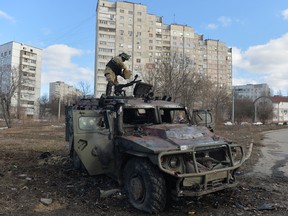Worst-case — ‘World War III and I am not being hyperbolic’: David Rosenberg

Kevin Carmichael: The future the economist paints is dark, but it’s within what now counts as the realm of possibility

Article content
“Breakfast with Dave” wasn’t a lot of fun this morning.
Advertisement
Story continues below
This advertisement has not loaded yet, but your article continues below.
Article content
Bay Street economist David Rosenberg used his widely read morning newsletter to set out his worst-case scenario for where the Ukraine conflict might lead: “It involves a World War III, and I am not being hyperbolic,” wrote the occasionally hyperbolic analyst.
To be clear, a global conflagration isn’t necessarily the bet on which Rosenberg would put his money. His best-case scenario is a diplomatic resolution, which is still probably the more likely outcome.
But if we’ve learned anything over the past couple of years, it’s the folly of banking on best-case scenarios. The future Rosenberg painted was dark, but within what now counts as the realm of possibility. What if Ukraine was Putin’s first move, and not his endgame? If he is motivated by rebuilding the Soviet Union, why would he stop there? The next step would be assembling Russian soldiers on the borders of another neighbour, and then daring the democratic powers to stop him.
Advertisement
Story continues below
This advertisement has not loaded yet, but your article continues below.
Article content
Will NATO really defend Estonia, for example?” Rosenberg wrote. “Will soldiers from Western Europe give their lives to protect the Baltic countries, Poland, etc.? NATO says it will, but NATO is composed of countries who are still bickering over sanctions. What will happen when they have to man the front lines?”
Rosenberg’s worst-case scenario then sees China going for Taiwan, North Korea testing South Korea’s resolve; and Iran, newly empowered by US$100 oil, baiting Israel and its other rivals in the Middle East. Rosenberg’s assessment of history is that Winston Churchill stood up to stop Hitler’s advance. He doesn’t see such a leader today. “Nobody like that exists, and all the world’s strongmen, with all their own grievances, know it too,” he wrote.
Advertisement
Story continues below
This advertisement has not loaded yet, but your article continues below.
Article content
-

David Rosenberg: The Russians aren’t coming, they’ve arrived — here’s what could happen next
-

Russia’s invasion of Ukraine, and the West’s response, signals the end of Canada’s hopes for the G20
-

Why China won’t rupture ties with the West to help Russia when push comes to shove
But people pay Rosenberg for investment advice, not history lessons. What does he recommend?
“Did I already say to buy gold, especially since cryptocurrencies proved of late that in troubled times, they are neither safe nor a haven?” he concluded.
Gold was trading around US$1,900 per ounce, little changed from the end of last week, but up about six per cent from the end of January, according to Bloomberg data.
• Email: [email protected] | Twitter: CarmichaelKevin
Advertisement
Story continues below
This advertisement has not loaded yet, but your article continues below.








